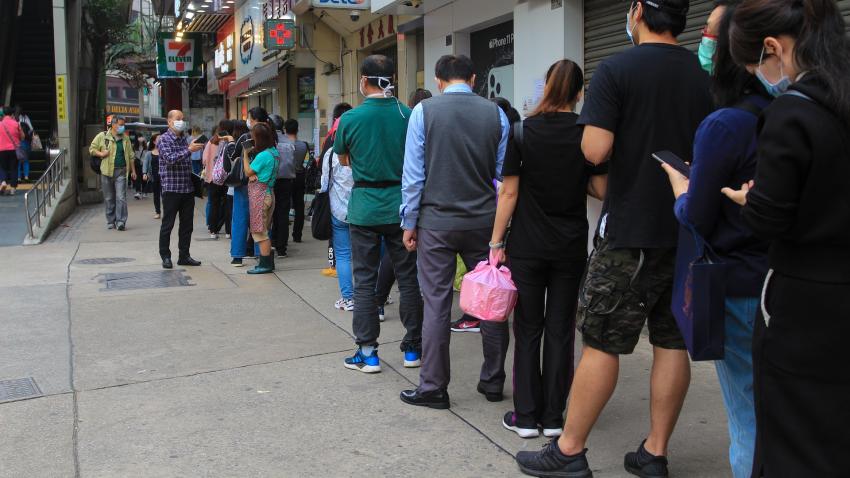The United Nations is bringing together representatives today from banks, funds and financial institutions that are working to mobilize US$1.2 trillion dollars in humanitarian and economic relief to developing countries reeling under the impact of COVID-19 to help expedite the flow of these resources to countries in need.
The meeting, the Financing for Development Forum’s second extraordinary meeting to offer concrete approaches to boost financing for rapid response and a sustainable recovery is being held under the auspices of the UN’s Economic and Social Council (ECOSOC).
“We cannot let those that are less able to deal with this crisis fall further behind. It is not only a moral obligation, but also in our best interest to help the most vulnerable countries emerge from the pandemic stronger.” said ECOSOC President Mona Juul, of Norway. “The risk of catastrophic economic failure is great. Funds, banks, and International Financial Institutions are opening up avenues for relief, so we want to put those with needs together with those who can help, and facilitate the way forward.”
The UN itself is working to mobilize $8.7 billion dollars through the Global Humanitarian Response Plan for COVID-19 ($6.7 billion) and the UN COVID-19 Response and Recovery Fund ($2 billion), for which it will be soliciting from donor governments and other stakeholders. The World Health Organization’s $1.7 billion COVID-19 Solidarity Response Fund, which is currently 36 per cent funded with $624.5 million already raised, facilitates rapid action by WHO to support countries.
These critical appeals, if fulfilled, will enable the international community to fight the virus in the world’s poorest countries, and address the needs of populations that are particularly vulnerable to the impacts of both COVID-19 and climate change.
Also participating in the meeting are the IMF, the World Bank Group and the African Development Bank, which are mobilizing $1 trillion, $175 billion and $13 billion respectively in COVID-19 relief. The multi-billion dollar Green Climate Fund, which has already suspended debt repayments for the next six months, will also be represented.
United Nations Deputy Secretary-General Amina Mohammed opened the conference, which also features panels with representatives from the financial institutions and countries in all stages of development from around the world.
“It is important to find multilateral solutions to address the underlying fragilities that were exposed by the pandemic. Our focus is on developing countries, which have all been hit indiscriminately by this pandemic, particularly the most vulnerable countries,” the Deputy Secretary-General said. “The United Nations system has been at the forefront of the global response, guiding global efforts and supporting country responses to tackle the health, humanitarian and socioeconomic impacts of the crisis.”
The meeting comes days after more than 50 world leaders participated in High-level event convened by the UN Secretary-General and the Prime Ministers of Canada and Jamaica to accelerate the global effort to mobilize financing for developing countries. Today’s meeting brings focus to the challenges faced by countries with limited fiscal space to invest in response and recovery due to debt, which is one priority theme on the top of the global policy agenda.
Another theme is the ongoing problem of illicit financial flows. In order to mobilize resources to recover better and ensure a robust and effective response to the economic depredations of the pandemic, all countries must tackle this issue.
Member States have consistently reaffirmed that the Sustainable Development Goals, and the financing for development process outlined in the Addis Ababa Action Agenda, must inform and shape the COVID-19 response and recovery going forward.
“Recently there has been open speculation that COVID-19 may set back the 2030 Agenda by a decade or more, and that is a possibility – but only if we allow it to throw us off course,” said Juul. “We’ve seen clearly that in all countries, rich or poor, the effects of the pandemic have been worsened by poverty, inequality, lack of access to healthcare and economic opportunity. Now is the time to push harder than ever to achieve the SDGs, and build a healthier, greener and fairer world.”
About UN DESA
UN DESA Products
UN DESA Divisions
- Office of Intergovernmental Support and Coordination for Sustainable Development
- Division for Sustainable Development Goals
- Population Division
- Division for Public Institutions and Digital Government
- Financing for Sustainable Development Office
- Division for Inclusive Social Development
- Statistics Division
- Economic Analysis and Policy Division
- United Nations Forum on Forests
- Capacity Development Programme Management Office

